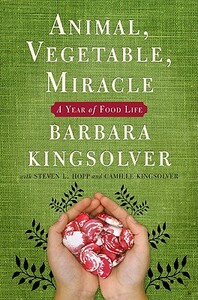Take a photo of a barcode or cover
informative
inspiring
reflective
slow-paced
Probably more like 4.5 stars, because it isn't a perfect book. But what it has inspired me to think about and want to do is pretty impressive to me.
I wanted to love this book. There were parts of it I did love. While I couldn't do what Kingsolver did, I liked the idea of reading about how she did it. However, about 3/4 of the way in, she lost me. It wasn't the guilt--I try to eat locally, I am very environmentally conscious--but my anger with her.
Kingsolver is a bestselling author. This means that she can afford to take time off to garden; this means that she can afford her prius, that kind of thing. Periodically through the book she talked about other kinds of people with disdain, and that really turned me off.
Here's what I mean. At one point she reflects on Hurricane Katrina, and notes that it made her think about how awful it is to have congested populations reliant on outside food sources. She nearly pooh-poohs those who held the administration accountable for the destruction there.
This, in many ways, contradicts what most environmentalists think--they think cities are a good idea. Those of us who live in them can often walk or take a bus to get to wherever we need to go; we drive short distances. Sure, it'd be lovely if we could all have a huge organic farm and grow all our own food. Delightful. But even if we could all move there, we'd all have to drive our (like non-hybrid) cars into cities to work every day, creating a very different kind of problem. It would amplify current conditions in suburbia (ie, much driving) in a rural setting. This is clearly not a solution, unless we can all work, as she often does, from home. So that ticked me off.
Also ticking me off was her frequent gloom-and-doom tirades. I agree, we have a climate problem, and that we also have an agricultural problem. I, however, don't see a solution in growing my own garden alone; in fact, if I lived, let's say, in a hurricane-prone area, my garden would be pretty much wiped out by an oncoming storm.
So there are good and bad things in here; I liked learning that I could make my own mozzarella and bean sprouts with very little effort; I did not, however, agree with her implied assessment that my urban lifestyle, which requires minimal driving, is in fact part of the problem rather than the solution.
Kingsolver is a bestselling author. This means that she can afford to take time off to garden; this means that she can afford her prius, that kind of thing. Periodically through the book she talked about other kinds of people with disdain, and that really turned me off.
Here's what I mean. At one point she reflects on Hurricane Katrina, and notes that it made her think about how awful it is to have congested populations reliant on outside food sources. She nearly pooh-poohs those who held the administration accountable for the destruction there.
This, in many ways, contradicts what most environmentalists think--they think cities are a good idea. Those of us who live in them can often walk or take a bus to get to wherever we need to go; we drive short distances. Sure, it'd be lovely if we could all have a huge organic farm and grow all our own food. Delightful. But even if we could all move there, we'd all have to drive our (like non-hybrid) cars into cities to work every day, creating a very different kind of problem. It would amplify current conditions in suburbia (ie, much driving) in a rural setting. This is clearly not a solution, unless we can all work, as she often does, from home. So that ticked me off.
Also ticking me off was her frequent gloom-and-doom tirades. I agree, we have a climate problem, and that we also have an agricultural problem. I, however, don't see a solution in growing my own garden alone; in fact, if I lived, let's say, in a hurricane-prone area, my garden would be pretty much wiped out by an oncoming storm.
So there are good and bad things in here; I liked learning that I could make my own mozzarella and bean sprouts with very little effort; I did not, however, agree with her implied assessment that my urban lifestyle, which requires minimal driving, is in fact part of the problem rather than the solution.
Barbara Kingsolver does non-fiction really well! In this book she explores how she and her family, husband and two daughters, decided to live off what they could get from their own county for a year. They got turkeys, chicken and set up a garden. They went to the farmer's market. They swore off bananas. Every family member got to chose something they would not give up - such as for example coffee.
I found myself thinking about my sister, she, like the author, loves the seed catalogue. I admit I also went a little bananas this year. Anyway, whatever size of garden or terrace you have, there is something you can grow and eat. Most of these things will taste a lot better than what you buy in the store, such as tomatoes.
I didn't really know that the turkeys these days, are mainly artificially inseminated and brought up by hand, for their very short lives. Turkeys are no longer bred for knowing how to copulate or mothering instincts. I find this slightly shocking, having grown up with my neighbor's free ranging and savagely defensive turkeys. A hissing turkey with ruffled feathers is a terrifying sight when you're four years old and there is no fence between you. The turkey chicks never got chased by dogs, and I'm quite sure one or the other dog was probably killed by a turkey. Anyway, Thailand in the 80's does not reflect on turkey life today. It was quite a nail biting chapter waiting to know whether Barbara's turkey would be able to breed or not.
If you are the least bit interested in making this planet a better place, or in gardening or growing your own food and saving money that way - read this book. It's fascinating. And even if you're not, read it anyway. It's informative, funny and important. I loved it.
I found myself thinking about my sister, she, like the author, loves the seed catalogue. I admit I also went a little bananas this year. Anyway, whatever size of garden or terrace you have, there is something you can grow and eat. Most of these things will taste a lot better than what you buy in the store, such as tomatoes.
I didn't really know that the turkeys these days, are mainly artificially inseminated and brought up by hand, for their very short lives. Turkeys are no longer bred for knowing how to copulate or mothering instincts. I find this slightly shocking, having grown up with my neighbor's free ranging and savagely defensive turkeys. A hissing turkey with ruffled feathers is a terrifying sight when you're four years old and there is no fence between you. The turkey chicks never got chased by dogs, and I'm quite sure one or the other dog was probably killed by a turkey. Anyway, Thailand in the 80's does not reflect on turkey life today. It was quite a nail biting chapter waiting to know whether Barbara's turkey would be able to breed or not.
If you are the least bit interested in making this planet a better place, or in gardening or growing your own food and saving money that way - read this book. It's fascinating. And even if you're not, read it anyway. It's informative, funny and important. I loved it.
When Barbara Kingsolver wrote about her family, her experience, the land and gardening it was lyrical but then she veered into data points and the magic was gone. I liked the challenge of living locally but she glossed over the prep and planning, and having experience in gardening.
informative
inspiring
reflective
sad
medium-paced
If you want to be further depressed about the state of American agriculture AND learn about turkey reproduction this is the book for you!
informative
inspiring
reflective
medium-paced
Very though-provoking. I didn't care much for the daughter's "essays" sprinkled in the book, they came off a little condescending. Other than that it was a very good read. I am inspired to expand our food-growing capacity and our backyard garden.
I learned a lot that I didn't know already and now I want to start preserving jams. I had to get it back to the library so I didn't read the end...but by then I found myself becoming less interested.
I plugged away at this book--definitely not as compelling as her fiction work, but an interesting book nonetheless. It's taken me awhile to read it, but I'm glad I did.
Kingsolver and her husband and two girls moved from Tucson to their farm in Virginia and committed to eating completely locally--either by growing their own food or buying it from neighbors and nearby farms. The book includes recipes and also essays by the husband, Steven Hopp.
It's the far end of the spectrum in terms of eating locally, and while I don't foresee taking things quite so far in our family, it definitely made me think about the food I buy and consume and how I can incorporate more local foods into our diet.
Kingsolver and her husband and two girls moved from Tucson to their farm in Virginia and committed to eating completely locally--either by growing their own food or buying it from neighbors and nearby farms. The book includes recipes and also essays by the husband, Steven Hopp.
It's the far end of the spectrum in terms of eating locally, and while I don't foresee taking things quite so far in our family, it definitely made me think about the food I buy and consume and how I can incorporate more local foods into our diet.



